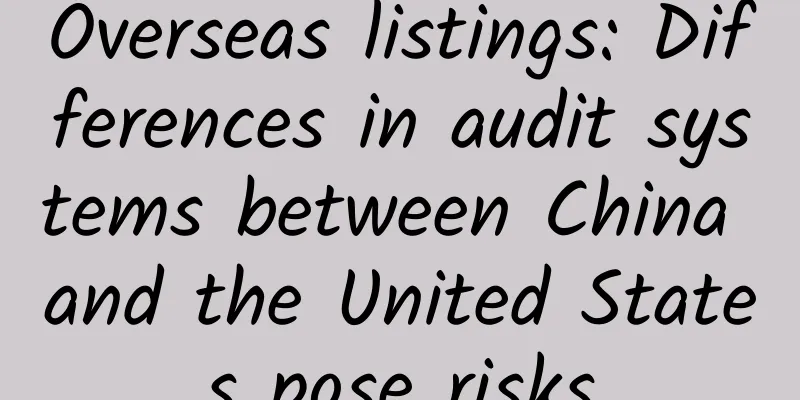Overseas listings: Differences in audit systems between China and the United States pose risks

|
The golden age of Chinese stocks listed in the US seems to have arrived again. At 22:30 Beijing time on September 19, Jack Ma and his team were celebrating Alibaba’s listing on Wall Street. My circle of friends was buzzing with news, and some people sent me pictures of the scene from the other side. This is a feast. After all, as China's largest e-commerce company, Alibaba has set a new record for US IPO fundraising, Jack Ma has become China's richest man, and the wealth of the veterans who have followed him for many years has doubled. All this happened at a time when A-share IPOs were facing intestinal obstruction, and overseas listings once again created a myth. Unfortunately, reporters are unwilling to flock to the gossip about wealth creation stories and avoid talking about tens of billions of dollars and huge personal wealth. Following the "Must-Death" feature in 2013, they are once again focusing on the prospectus and other details, intending to get a glimpse of the system differences between the Chinese and American capital markets and clarify the root cause of why high-quality resources are sought far away instead of near. The enthusiasm for going overseas remains unabated As of now, according to rough estimates, there are more than 100 Chinese companies that have gone overseas to list in the United States alone. This phenomenon is extremely obvious in the Internet industry. In 1999, China.com became the first to try out the new technology in the industry, and in the following 15 years, it has set off five waves. Sohu , Baidu , Tencent , JD.com and Alibaba, many Internet companies have competed in the international capital market. In the first half of 2014, among the 10 companies listed overseas, 8 were pure Internet companies, and the remaining two, iKang Guobin and Danai Technology, were both involved in online business. In fact, companies in other fields are also enthusiastic about listing overseas. Overall, the "main battlefield" for domestic companies to go overseas for listing mainly covers finance, consumer goods manufacturing, chain operations, real estate, Internet, medical and health care and other industries. The financial industry has the highest financing scale, accounting for 45.90% of the total IPO amount of Chinese companies in 2013. According to the White Paper on Overseas Listings of Chinese Enterprises in 2013-2014 written by Eagle Capital, as of 2013, a total of 83 Chinese enterprises completed IPOs in overseas capital markets, raising a total of approximately RMB 119.956 billion. The number of IPOs and the amount of financing increased by 40.68% and 91.74% year-on-year respectively. "In the second half of 2014, mainland Chinese companies are expected to become more active in the U.S. and Hong Kong capital markets," the white paper states. The White Paper also pointed out that the Hong Kong capital market was very active in 2013. In that year, a total of 67 mainland Chinese companies landed in the Hong Kong capital market, a year-on-year increase of 71.79%; the total financing scale reached about 113.578 billion yuan, a year-on-year increase of 94.76%, nearly doubling that of 2012. Another 8 companies landed in the New York Stock Exchange and Nasdaq capital markets in the United States, raising a total of 5.339 billion yuan. According to data from US stock information provider MarketWatch, in the second quarter of this year, Chinese stocks raised a total of US$3.5 billion through IPOs in the United States, the highest amount since the fourth quarter of 2007. Many domestic investment bankers have told the 21st Century Business Herald that behind the glamorous halo of companies going overseas for listing is actually the loss of high-quality resources in the domestic capital market. All of these overseas listed companies were nurtured in the domestic capital soil, but when it comes to the listing and dividend stage, it is the overseas investors who get the benefits. Song Liping, general manager of the Shenzhen Stock Exchange, made it clear during the 2014 National People's Congress and the Chinese People's Political Consultative Conference that the choice of Internet companies such as Dangdang.com and Alibaba to go public overseas is worthy of reflection. The GEM is still small in scale and is at a critical stage of development in terms of both scale and quality. Flexible system promotes development In fact, most of the companies that go overseas to list have to switch because they cannot meet the domestic listing requirements. The domestic capital market has very strict requirements on the equity structure and profitability of listed companies. Internet leaders such as Baidu, Tencent and JD.com cannot meet the standards for listing on the A-share market. Executives of Baidu and Tencent have publicly stated that they are not not considering the A-share market, but that the current situation cannot meet the standards. "The reason why the U.S. market attracts Chinese investors is that the listing systems in China and the U.S. are different," said a person from a world-renowned investment management company in an interview with a reporter from 21st Century Business Herald. "The U.S. listing system is like a registration system, which does not require a company's previous profitability. It pays more attention to the company's profit model. In other words, the key word for listing in the U.S. is the profit model. There is no need for review, and the system is relatively more flexible." In terms of institutional flexibility, the US market does have certain advantages. A-share IPOs still require waiting in line, and some companies are worried about missing out on a good period of development, so they choose to go public overseas. In addition, the environment is also an important reason. "The loss of these companies is largely due to the short-sightedness of domestic investors." Zuo Xiaolei, chief economist of Galaxy Securities, said earlier, "Since the domestic enthusiasm for investing in the 'last mile', some Internet companies have difficulty obtaining funds in the early stages of their business. Most of the venture capital they receive comes from overseas. Restricted by the rule that 'foreign companies cannot be listed in the mainland', these 'foreign companies' are destined to be unable to be listed in the mainland after they grow up." A Tencent staff member said in an interview with a reporter from 21st Century Business Herald that "the focus of domestic and foreign capital markets is different. Domestic capital markets are more used as a way to provide financing channels for successful companies, while foreign capital markets are often used to promote the early development of companies. The two sides have different focuses." Judging from the performance of companies listed overseas, they have indeed achieved good results. In the first half of 2014, the 10 companies listed in the United States were DaNai Technology, iKang Guobin, Leju, Sina Weibo, Cheetah, Tuniu Travel Network, Jumei, JD.com, Zhaopin.com and Xunlei. As of July, the average increase in the stock prices of these companies was about 30%. There is helplessness behind the glamour In fact, despite their glamorous appearance, overseas listed companies also face many frustrations and troubles, and their survival conditions are not as good as the outside world imagines. Recently, Tianhe Chemical and Century Internet have been frequently ambushed by short sellers. Last Wednesday, an American investment institution called Trinity Research Group released a report saying that 21Vianet may be a scam and predicted that its stock price would fall to zero. The agency said that the results of the six-month investigation showed that "21Vianet had engaged in fraudulent financial and operational performance; on-site investigations of subsidiaries acquired by 21Vianet showed that these companies were basically ghost towns." Affected by this, ChinaCache's stock price fell 43% in two days. Subsequently, the company's CEO Chen Sheng issued a statement refuting the aforementioned agency's claims, and the situation took a turn for the better. In fact, in recent years, there have been many cases of Chinese concept stocks being sniped. From Evergrande, Qihoo 360, New Oriental, to 21Vianet, Tianhe Chemical and Lottery 500, all have been fiercely attacked by short-selling institutions. Behind the tragic situation is a difficult living environment. According to PwC statistics, 19 Chinese companies withdrew from the US capital market in the first half of 2012. In addition to being repeatedly shorted, Chinese stocks are also under pressure from regulatory pressure. "The core issue is the conflict between China and the United States over whether the audit documents of listed companies should be made public," the asset management person told the 21st Century Business Herald reporter. "So far, the two sides are still in dispute over this." According to the person, in 2013, the PCAOB (Public Company Accounting Oversight Board) reached an agreement with Chinese regulators, including allowing US regulators to investigate the audits of companies suspected of fraud, but China still does not allow US regulators to directly investigate audit work conducted in China. "For investors, the main risk of Chinese stocks listed in the US comes from the unresolved dispute over access to audit materials. The securities regulatory authorities of the two countries seem to be far from reaching an agreement," the person told the 21st Century Business Herald reporter. As a winner of Toutiao's Qingyun Plan and Baijiahao's Bai+ Plan, the 2019 Baidu Digital Author of the Year, the Baijiahao's Most Popular Author in the Technology Field, the 2019 Sogou Technology and Culture Author, and the 2021 Baijiahao Quarterly Influential Creator, he has won many awards, including the 2013 Sohu Best Industry Media Person, the 2015 China New Media Entrepreneurship Competition Beijing Third Place, the 2015 Guangmang Experience Award, the 2015 China New Media Entrepreneurship Competition Finals Third Place, and the 2018 Baidu Dynamic Annual Powerful Celebrity. |
<<: Radio and Television removes TV apps from shelves: industry and users in a lose-lose situation
>>: What does Jack Ma’s “ecosystem” really mean?
Recommend
Xpeng's new car poster exposed, released in 2021, or the world's first equipped with LiDAR
Recently, He Xiaopeng, founder of Xpeng Motors, p...
Musk becomes the world's richest man, is the secret the "first principles"?
Musk is the richest man in the world, and he owns...
This iOS 15 push notification design guide is worth reading carefully by designers!
Compared to last year's WWDC 2020, which rele...
[Tencent Bugly Tips] Canvas Particle Engine Hands-on Tutorial to Impress Leaders and Users
[[165460]] Preface Well, calling it a "parti...
If even paying money doesn’t work, how can we wake up users?
If you ask me, is there any way to quickly double...
As Tik Tok becomes Vlog, what opportunities are there for brand marketing?
This year, especially since the second half of th...
Review of Pinduoduo’s gameplay in 2019: branding and hit products!
Today I will mainly share with you some trial and...
BAT is competing for mini programs. Who will be eliminated first?
Since WeChat launched mini programs, everyone has...
"Grave Robbers' Chronicles": The first shot in the video website's comeback?
After continuing to burn money and suffer losses ...
Why does China launch so many satellites?
This article was reviewed by Liu Yong, space phys...
A Beginner's Guide to Internet Finance Operations: An Article to Understand 6 Types of Internet Finance Products
I have been working in the wealth management depa...
Users (fans) start to leave at an accelerated rate, what else can you do?
If you are extremely sensitive to user activity, ...
Excellent landing page cases in various industries, conversion rates soared!
When a cool title is paired with a bad landing pa...
3 questions to ask new media public accounts to increase followers through content!
Speaking of increasing followers on public accoun...
Four key links in O2O operation
Although everyone has been playing with O2O in re...



![[Chasing Dreams with Stars] Min Enze: Turning stones into gold, a catalyst for life that never fades](/upload/images/67f23907b7a3a.webp)





